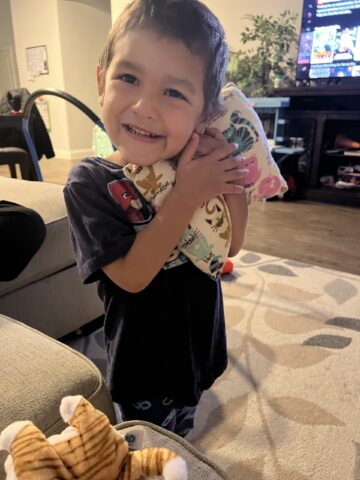Sam sat next to the beeping machine, bleary-eyed and sore, wishing she could scoop up and hold the little boy lying on the bed next to her. He was finally sleeping, as she should be, but her mind was racing with worry. She wondered if he was in pain. She glanced at his distended, swollen belly before looking down at her own and wondered how she would be able to leave him when the time came to give birth to his brother. She worried Kaiden would miss her, it ached to think she would have to leave his side even for a moment. She wondered if the steroids they gave him were working, she wondered if the latest blood draw would show a decrease in his bilirubin levels. They had been in the ICU for days, looking for answers but only finding more questions.
What started with a yellowing of his eyes rapidly progressed into acute liver failure. Doctors could not identify what caused the failure and therefore could not treat it. Over the course of a week, Kaiden’s condition continued to decline. He was no longer alert for the brief moments he was conscious and he was needing daily dialysis just to keep his body functioning. His doctors gently began mentioning the words “liver transplant” to prepare his family for what was to come. A few days later, they met with a transplant team for a crash course in caring for a transplant patient. He was approved and put on the list as 1A for a liver- the highest priority.
The first offer of a transplant came soon after he was placed on the list, but a record-breaking storm made transport impossible. A second offer a day later was deemed unsuitable. The third offer was accepted and on February 13, Kaiden received a new liver in a two-step surgery. A third surgery became necessary after Kaiden’s bile duct became occluded, requiring doctors to place a stent.
His condition began to improve and 35 days after his admission, Kaiden was able to go home. He finally got to meet his newborn brother and spend some precious time with his family. Life certainly does look a little different than before, though.
He is on a strict regimen of 12 different medications, taken orally three times a day. He has standing appointments twice a week with his doctors for monitoring and they’ve already lost count of the number of blood draws he’s had. The anti-rejection meds he must take while his body acclimates to his new liver also cause him to be immunocompromised. He cannot be out in public or even out in the sun for too long. While he was in the hospital, his gross motor functions regressed and he had to relearn how to sit, crawl, stand and walk on his own.
Kaiden’s journey is just starting and you can help him take the next steps.
Transplant costs vary tremendously based on a number of factors, but generally transplants can cost between $250,000 and $800,000. These costs do not include family needs including lodging, food and transportation during the transplant stay. Additionally, post-transplant medications and medical care costs often add up to more than $10,000 annually. No plan pays all transplant-related expenses and even a ‘solid’ insurance plan may only cover 80% of the ‘normal and customary’ expenses incurred within a pre-determined network or at a specific hospital. For many families just like Kaiden’s these extreme expenses are crippling.
The Children’s Organ Transplant Association (COTA) helps children and young adults who need a life-saving transplant by providing fundraising assistance and family support. COTA is the nation’s only fundraising organization solely dedicated to raising life-saving dollars in honor of transplant-needy children and young adults. 100% of each contribution made to COTA in honor of our patients helps meet transplant-related expenses. COTA’s services are free to our families, and gifts to COTA are tax deductible to the fullest extent of the law.
Even the smallest amount can make a difference. Please help by clicking on the “GIVE” button and by sharing Kaiden’s story. Donate today!”

